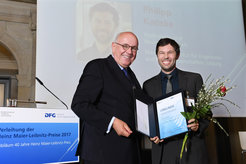Three questions to...
…Philipp Kanske, winner of the Heinz-Maier-Leibnitz Prize.
Thanks to his research we now know: People who have difficulties regulating their emotions are at high risk of developing a psychological disorder. This is also visible in the brain early on—even before changes in behaviour are perceptible. Training could prevent the disorder’s outbreak.

Mr. Kanske, you just received the most important award for junior scientists in Germany. What makes your work outstanding?
My research is dedicated to emotions. What are emotions, how do they influence our thinking and how can we regulate them? Emotions are crucial for human experience and behaviour, and we can treat psychological disorders in a better way when we understand how emotions are changed in theses cases. My work has shown that besides what a person experiences and how a person behaves, we should also focus on their brain. Here, we can determine changes before they are perceptible in behaviour, that is to say, before the psychological disorder has emerged.
We could show in several studies that people with bipolar disorder (also known as manic depression, editor's note) are not able to regulate their emotions properly, because they are not able to reduce the activation of the amygdala. Interestingly, healthy people who carry a high risk for bipolar disorder show the same problems with regulating their emotions and amygdala. These results could mean that early intervention, that means training a person to regulate their emotions in the early stages, could prevent the outbreak of this disorder.
How did you arrive at your research field?
Somehow I have always been fascinated by emotions as well as by the complexity of the brain. After my internship here at MPI CBS and my master studies with an inspiring neuroscientist in Oregon, Michael Posner, it was clear to me that I didn’t just want to read about the emotional brain, but rather investigate it. I had great teachers that enabled me to do this—Sonja Kotz, Angela Friederici, Michèle Wessa, Herta Flor, Tania Singer. And since I’m also a psychotherapist, I’m also confronted with problems people have with emotions, which motivates me to answer the question how emotions can be changed by training, that is, how plastic they are.
This important award is now under your belt, what’s next?
I would like to further support the understanding of how emotions influence our sometimes difficult interactions with other people. Why? Because we learn about the problems that should be taken into account in psychotherapy. I was pleased to contribute to the ReSource Project—a training study for targeted meditation techniques to improve our handling of emotions—at MPI CBS over the last five years. And to build a basis for improved psychotherapy in the future. Furthermore, I would like to investigate the causes of the problems in handling emotions, and find out what impact stressful situations, for example, wars and flights, have on these problems. If we better understand what protects a person’s psychological wellbeing despite traumatic experiences, we could help those who have a high risk for psychological disorders.

The winners of this year's Heinz Maier-Leibnitz Prize together with Federal Minister of Education and Research, Johanna Wanka, and DFG president, Peter Strohschneider (left), in Berlin. © DFG / David Ausserhofer











